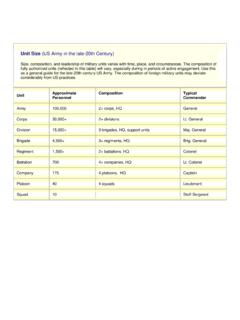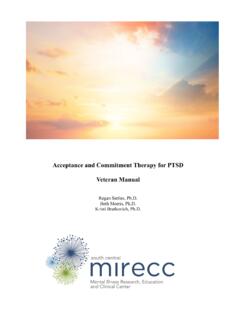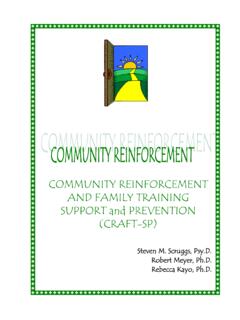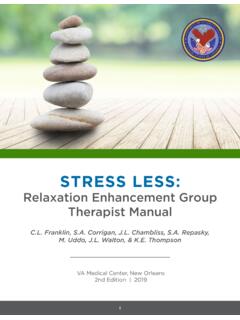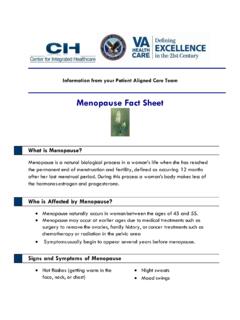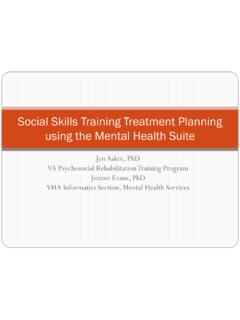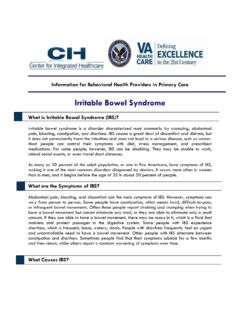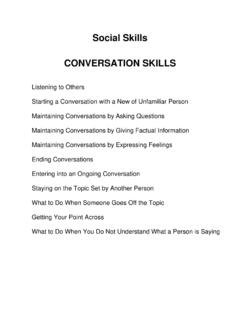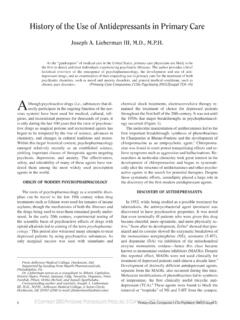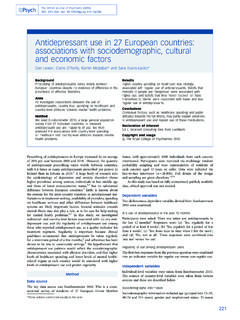Transcription of Using Antidepressant Medications Successfully
1 Information from your Patient Aligned Care Team Using Antidepressant Medications Successfully A person s body, behavior, and thoughts interact. Once depression becomes a problem, this interaction may lead to a downward spiral in mood and hopefulness. Two courses of action help reverse the downward direction and create a positive spiral , use of both Medications and coping strategies. Helpful Tips 1) Use of Medications : Medications may help you feel better. Antidepressant Medications restore the presence of neurotransmitter substances that become depleted by stress. Medications may work somewhat slowly. Therefore, it is best to use Medications in combination with behavioral planning and use of coping strategies. 2) Strategic use of coping strategies: Use of active coping strategies helps you reverse the downward spiral of depression.
2 When you address life problems with effective strategies, you have more opportunities to create positive conditions in your life. Make a determined effort to work with your health care provider in planning skillful use of coping strategies. You are much more likely to succeed in Antidepressant treatment when you have accurate information about all aspects of medication use. Please review the following details and discuss any questions you have with your healthcare providers. Starting medication : Start your medication as soon as it is prescribed. The sooner you start, the sooner you will experience the desired benefits. Keep in mind, it generally takes 2 to 3 weeks before you will start noticing a reduction in symptoms and 4-8 weeks for symptoms to fully subside. The first thing most people experience is improved sleep, decreased fatigue and some improvement in emotional control.
3 Antidepressants mostly affect the physical symptoms of depression. Other symptoms, such as depressed mood and low sense of self-worth, may respond only partially to medication treatment. In other words, antidepressants are not happy pills ; they do not totally erase feelings of sadness or emptiness. Remembering to take Medications : Take your medication at a certain time every day. During the first several weeks, you may want to leave yourself several reminder notes. Some people use a behavioral hygiene task, such as teeth brushing, as a cue to take their Using Antidepressants Successfully (continued) medication . Also, some people may want to leave an extra bottle of medication in a desk drawer at work in the event that they forget to take the medicine at home. Carrying on with other activities: You may continue with your normal activities while taking Antidepressant Medications .
4 If you do notice minor sedation or sleepiness in starting a medicine, avoid driving or carrying out hazardous activities. Sleepiness will usually diminish. If it does not, talk with your provider about a medication change. Taking antidepressants with other Medications : You may take antidepressants with most other types of Medications . However, do talk with your provider about the compatibility of Antidepressant Medications with other Medications you are taking. Taking antidepressants and consuming alcohol: Do not drink alcohol while taking Antidepressant Medications . Alcohol can block the effects of the medication . Addiction? Antidepressants are not addictive. Increasing medication dose: Increase your medication dose according to your provider s directions. In starting Antidepressant Medications , you start with small doses initially and increase gradually.
5 Do not worry that you are taking too many pills. Your provider is prescribing a slow increase in dose in order to help you avoid side effects. After you reach your therapeutic dose, your provider will probably prescribe tablets that are larger in dosage, which then allows you to take fewer tablets. Continuing to take the medication : Take the medication until you and your provider decide that you are ready to stop the medicine. In most cases, your provider will ask you to take the medicine for at least six months after you reach a therapeutic dose. Do not stop taking the medicine because you feel better. Use this period of feeling better to work on developing coping skills that will help prevent relapse. The relapse rate when people discontinue Medications too early is as high as 80%.
6 Wait and plan how and when to stop with your provider. Handling Side Effects Most Antidepressant Medications have mild side effects. The side effects are usually temporary and diminish or disappear during the first few weeks of treatment. If you experience side effects that are more severe, call your provider. She/he will probably suggest one or more of the following strategies: Change the time that you take the medication Change the dose of the medicine Use a remedy for the side effect Change to a different medication Using Antidepressants Successfully July 2013 Page 2 Using Antidepressants Successfully (continued) The following table summarizes common side effects and possible remedies or strategies for coping with side effects. Most Medications have only one or two of the side effects listed in this table.
7 Common Side Effect Remedies Dry Mouth Drink plenty of water. Chew sugarless sugarless gum or Appetite Loss Take the medicine with food. Prepare food so that it is appetizing and small healthy meals. Blurred vision Remind yourself that this will be a temporary with your doctor if it Eat more fiber-rich a stool speeded up Tell yourself, This will go away within three to five days. If it does not, call your doctor or Medications early in the more about a warm bath and have a light snack before bed. Avoid exercising vigorously late in the fresh air and take frequent taking your medicine earlier in the evening, or if you are taking your medicine in the day ask your doctor if you can take it at night. DizzinessStand up plenty of you are worried, call your problemUsing Antidepressants Successfully July 2013 Page 3 Using Antidepressants Successfully (continued) Talk with your doctor.
8 A change in Medications or a medication holiday may help. Source Using Medications Successfully . An ICP Booklet. P. Robinson, C. Wischman & A. Del-Vento (1996). Treating Depression in Primary Care: A Manual for Primary Care and Mental Health Providers. Reno: Context Press. Preston, J. & Johnson, J. (2000) Clinical Psychopharmacology Made Ridiculously Simple, Edition 4. Miami: Antidepressants Successfully July 2013 Page 4
